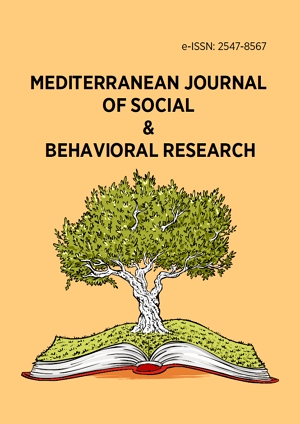Research Article
Lifelong Learning for All!
More Detail
1 University of Gävle, Faculty of Education and Business Studies, Department of Educational Theory, SWEDEN* Corresponding Author
Mediterranean Journal of Social & Behavioral Research, 4(2), June 2020, 35-39, https://doi.org/10.30935/mjosbr/9599
Published: 01 August 2020
OPEN ACCESS 1240 Views 1466 Downloads
ABSTRACT
This paper is a story about lifelong learning in a Swedish context. The need for lifelong learning is a recurring issue in the political discussions and media reporting. According to Delors, J. (1996), lifelong learning is a prerequisite for modern society. A common way to discuss lifelong learning is to make a difference between formal, informal and non-formal learning. According to Dunn, E. (2003), non-formal learning is about skills, knowledge, attitudes and behaviors that people acquire in their daily lives. We on the other hand believe that all kinds of learning always include the above concepts and that the discussion of lifelong learning is about creating certain subject. Our aim is to visualize desirable subjects through discourse analyze (Foucault, M. 1980). The empirical material consists of syllabus for a project at the University of Gävle in which individuals with intellectual disabilities are offered education at post-secondary level.
CITATION (APA)
Florin, K., Hedlund, E., & Åkerblom, E. (2020). Lifelong Learning for All!. Mediterranean Journal of Social & Behavioral Research, 4(2), 35-39. https://doi.org/10.30935/mjosbr/9599
REFERENCES
- Andersson, R. (2002). Kriminalpolitikens väsen. Stockholm: Stockholms universitet Kriminologiska Institutionen Avhandlingsserie Nr 10.
- Askling, B. & Foss-Fridlizius, R. (2000). Lifelong learning and higher education: The Swedish case. European Journal of Education, 35(3). https://doi.org/10.1111/1467-3435.00025
- Dunn, E. (2003). Life Through Learning; Learning Through Life, The Lifelong learning Strategy for Scotland: Summary (p. 3) The Scottish Government, http://www.scotland.gov.uk/Resource/Doc/47032/0028820.pdf
- Edwards, R. & Nicoll, K. (2004). Mobilizing workplaces: actors, discipline and governmentality. Studies in Continuing Education, 26(2), 159-173. https://doi.org/10.1080/158037042000225191
- Feinstein, L., Sabates, R., Anderson M.T., Sorhaindo, A. & Hammond, C. (2006). What are the effects of education on health? https://www1.oecd.org/edu/innovation-education/37425753.pdf
- Fejes, A. (2006) The Planetspeak Discourse of Lifelong Learning in Sweden: What is an Educable Adult? Journal of Education Policy, 21(6), 697-716. https://doi.org/10.1080/02680930600969266
- Fejes, A. & Salling Olesen, H. (2010) Envisioning future research on the education and learning of adults. European journal for research on the education and learning of adults, 1(1-2), 7-16. https://doi.org/10.3384/rela.2000-7426.relae1
- Folkhälsomyndigheten. (2012). http://www.folkhalsomyndigheten.se/amnesomraden/livsvillkor-och-levnadsvanor/folkhalsans-utveckling-malomraden/ekonomiska-och-sociala-forutsattningar/utbildningsniva/ 2014-09-09 (The Public Health Agency).
- Foucault, M. (2003). Regementalitet i Fronesis (2003) Lag och ordning 14-15 Göteborg: Tidskrift föreningen Fronesis
- Foucault, M. (2004, 1976). Sexualitetens historia band 1 Viljan att veta. Translation: Gröndahl, B. Göteborg: Daidalos, Originals title: Histoire de la sexualité La volonté de savoir
- Foucault, M. (2006). Biopolitikens födelse i Wennerhag, M & Unsgaard (red.) (2006) Fronesis Liberalism 22 – 23 Göteborg: Tidskrift föreningen Fronesis
- Groot, W. & Maassen van den Brink, H. (2006). What does education do to our health? In Measuring the Effects of Education on Health and Civic Engagement. Proceedings of the Copenhagen Symposium. OECD
- Hultqvist, K. & Petersson, K. (red.) (1995). Nutidshistoria: några inledande utgångspunkter I Foucault Namnet på en modern vetenskaplig och filosofisk problematik. Stockholm: HLS Förlag
- Halvtidsrapport. (2012). Hälsoinspiratörsprojektet: Högskolan i Gävle (Interims report)
- Kivinen, O. & Rinne, R. (1998). State, Governmentality and Education the Nordic experience. British Journal of Sociology of Education, 19(1), 39-52. https://doi.org/10.1080/0142569980190103
- Kowalczyk, J. (2006). Immigrants as “Outlaw Ontologies”: Italian Educations policy and the non – Italian student. In Popkewitz, T & Petersson, K & Olsson, U & Kowalczyk, J. (red.) (2006). The future is not what it appears to be: pedagogy, genealogy and political epistemology: In Honour and in Memory of Kenneth Hultqvist Stockholm: HLS Förlag
- Lemke, T. (2001). ‘The birth of bio politics’: Michel Foucault’s lecture at the Collége de France on neo-liberal Governmentality. Economy and Society, 30(2), 190–207. https://doi.org/10.1080/03085140120042271
- Lindblad, S. & Popkewitz, T. (2000). Public discourses on education governance and social integration and exclusion: analyses of policy text in European contexts. Uppsala. Department of Education Uppsala University, Uppsala Reports on Education 36
- Popkewitz, T. (1998). Struggling for the soul: the politics of schooling and the construction of the teacher New York: Teachers Collage, Columbia University
- Rose, N. (1999). Powers of Freedom Reframing political thought Cambridge: University Press. https://doi.org/10.1017/CBO9780511488856
- Regeringens Proposition 2001/02:15 Den öppna högskolan. Stockholm.
- Simons, M. & Masschelein, J. (2006). The learning Society and Governmentality: An introduction. Educational Philosophy and Theory, 38(4), 417-430. https://doi.org/10.1111/j.1469-5812.2006.00202.x
- Högskolan i Gävle. (2012). Syllabus 1-12 Högskolan i Gävle akademin för hälsa och arbetsliv: Högskolan i Gävle.
- Tuschling, A. & Engemann, C. (2006). From Education to Lifelong Learning: The emerging regime of learning in the European Union. Educational Philosophy and Theory, 38(4), 451-469. https://doi.org/10.1111/j.1469-5812.2006.00204.x
- Utbildningsdepartementet. (2001). Debatten om det livslånga lärandet: den nationella konsultationen om EU-kommissionens memorandum om livslångt lärande. Stockholm: Utbildningsdepartementet.
- UNESCO. (1996). Learning: the Treasure Within. UNESCO: Paris.

 The articles published in this journal are licensed under the CC-BY Creative Commons Attribution International License.
The articles published in this journal are licensed under the CC-BY Creative Commons Attribution International License.